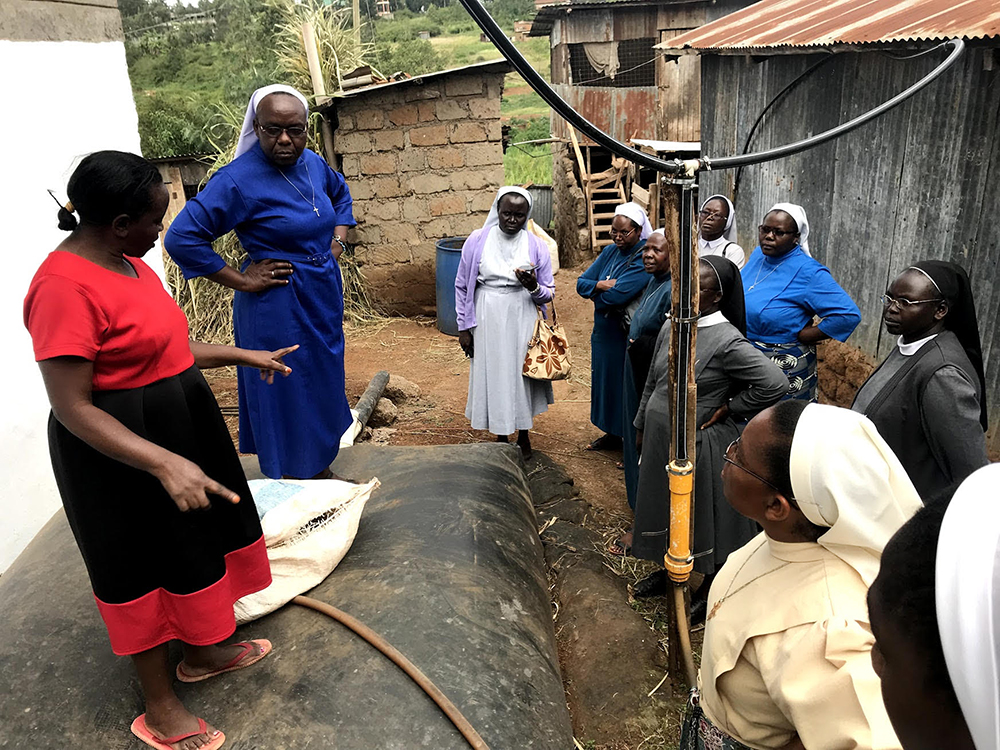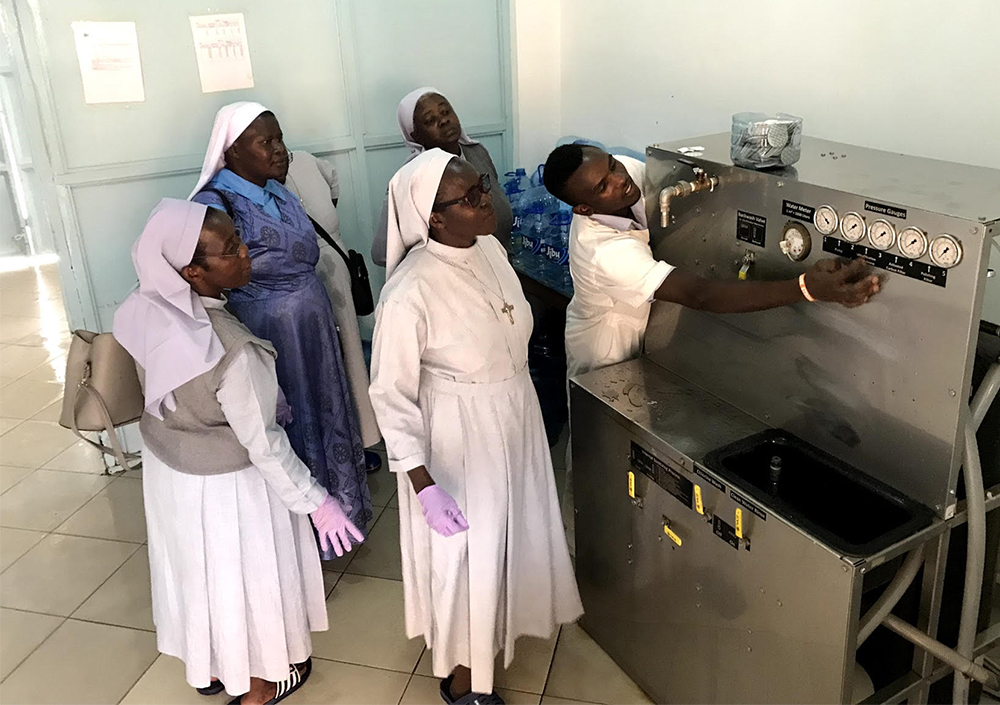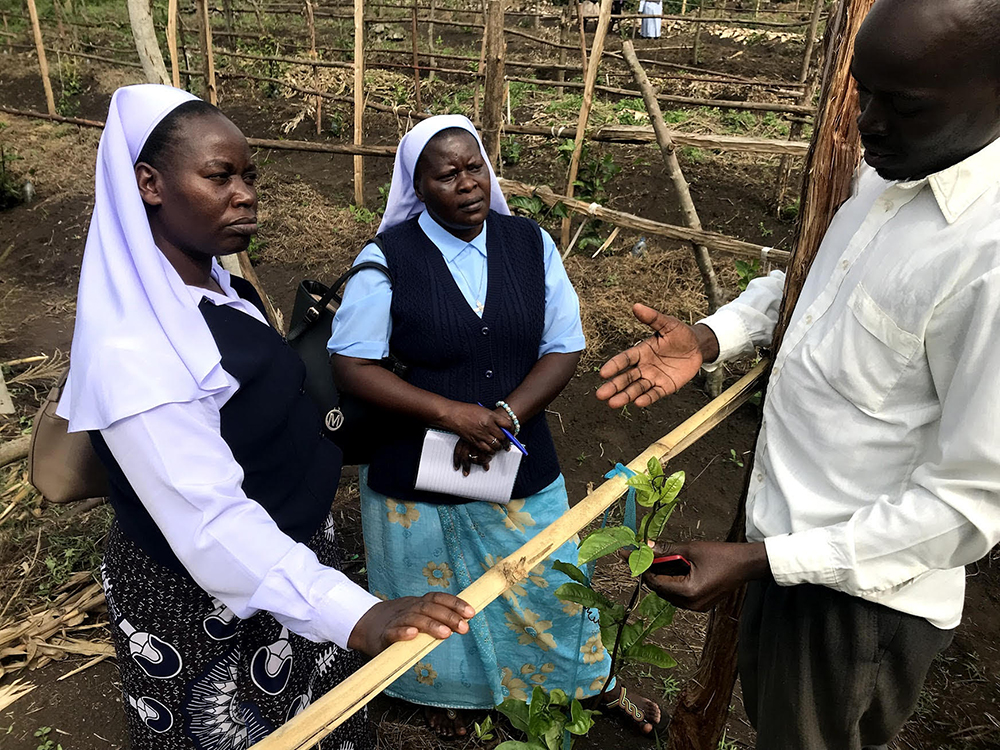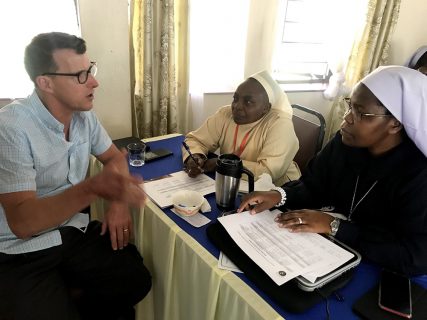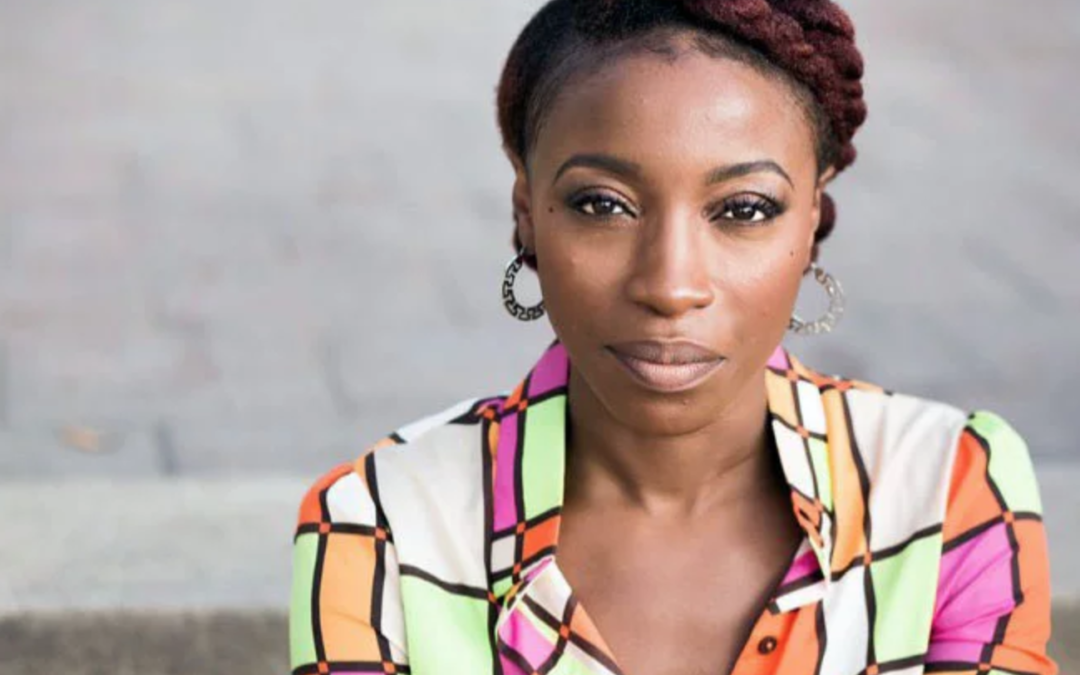
by Nicola A. Menzie, RNS | Apr 8, 2019 | Headline News |
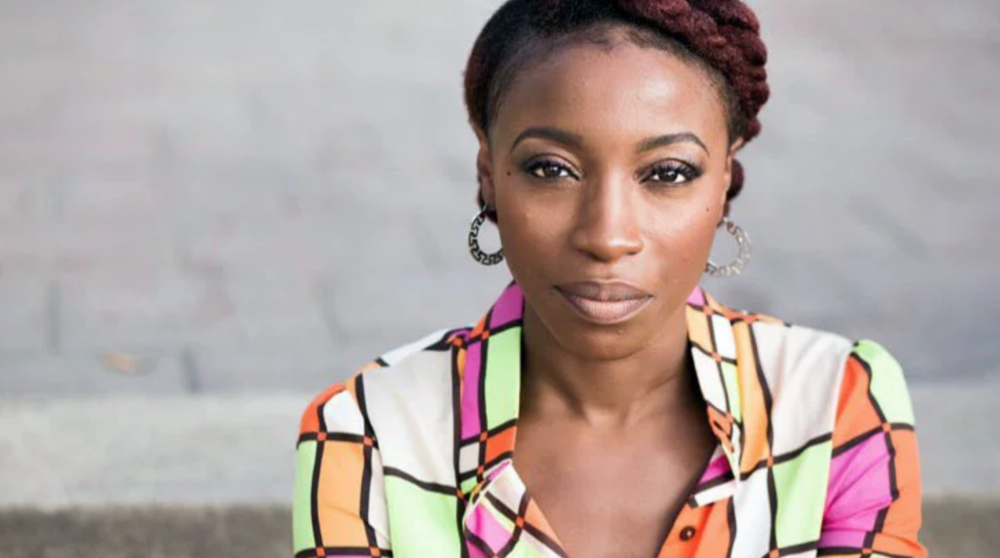
A Christian organization whose mission is to equip women to be peacemakers has been accused of trying to erase comments by a black Christian speaker about white supremacy.
During an onstage interview, Ekemini Uwan, a Nigerian-American public theologian, told an audience at the recent Sparrow Conference for Women in Dallas that their concept of race was incompatible with the Bible.
In response, several women walked out.
Uwan said organizers tried to downplay any sign of her presence at the conference.
While the Sparrow Women social media accounts published photos, excerpts and highlights from several conference speakers, no images or quotes from Uwan’s comments appeared on its feeds. A video of the interview that had been published to YouTube of her remarks was removed for copyright violation.
Uwan told RNS that she had to hire an attorney to force Sparrow Women to send her photos and video of her interview.
On Friday, Sparrow Women apologized for “content shared during the testimonial interview at the 2019 Sparrow Conference,” held March 29-30 at The Music Hall at Fair Park in Dallas, Texas.
”We publicly apologize to both Ekemini Uwan and the conference participants for not handling such a complex subject with more care and therefore putting everyone involved in such a difficult place,” the statement reads. “That is not the heart or mission of Sparrow Women and we take responsibility for what happened. We want to be peacemakers and see gospel reconciliation and we fell short of our goal here. We will learn from this and are praying for healing and peace for everyone that participated in this year’s conference and those that have been affected by this.”
When asked for more details about why they apologized, leaders at Sparrow declined to elaborate.
“Thank you for reaching out, at this time we are unable to say anything beyond our statement,” Director of Operations Kristen Rabalais said in an email in response to a request for further comment.
Uwan, a co-host of the popular “Truth’s Table” podcast, dismissed the apology as a “PR cleanup job.” Uwan and two other Christian black women who host “Truth’s Table” routinely address white supremacy, racial justice and other related issues.
Uwan said that Sparrow’s founder, Rachel Joy, told her she was a fan of the podcast, so Joy should have known what to expect during her talk.
“If you listen to ‘Truth’s Table,’ my interview was standard ‘Truth’s Table.’ There was nothing there that was like completely new, or mind-boggling,” Uwan said.
Sparrow Women started more than seven years ago as a church homegroup and attracted women who were “African American, Caucasian, Asian, Hispanic, and from different socio-economic backgrounds,” according to the organization’s website.
The organization described the recent conference as “a catalytic event for over 1,500 women” to learn about racial division and social justice.
Uwan, a Westminster Theological Seminary alumna, was interviewed at the conference by Elizabeth Woodson, Sparrow Women’s resources coordinator.
“Race is not a category in the Bible. It did not exist because it is not something that will be redeemed — it was meant to hold and hoard power,” Uwan told Woodson, according to a transcript of the interview provided by conference attendee Carmen J. Caccavale.
“Because we have to understand something — whiteness is wicked,” Uwan said. “It is wicked. It’s rooted in violence, it’s rooted in theft, it’s rooted in plunder, it’s rooted in power, in privilege.”
She told the audience they should give up whiteness and “recover” the ethnic identities “your ancestors deliberately discarded.” Rather than thinking of themselves as white, they should try to rediscover their immigrant cultural ancestry: “Are you Italian, are you Irish, are you Polish, are you Turkish?”
“Celebrate that,” she said.
Uwan, who said she saw about 10 women walk out during the discussion, mentioned the term “whiteness” more than two dozen times throughout the 30-minute talk.
Sarah Humphries, a 30-year-old white woman from Denton, Texas, attended the Sparrow Conference for the first time, specifically to hear from Uwan and another black speaker, Jackie Hill Perry.
In a phone interview, Humphries said audience members near her seemed upset by Uwan’s remarks — especially when she said the word “whiteness.”
“I was really surprised at how angry the people in front of me and the people from my left were during Ekemini’s conversation,” Humphries said.
In an essay at The Witness, freelance writer Deedee Roe said that most conference attendees were white and that they were “angry and uncomfortable” during Uwan’s interview. She said that after Uwan told audience members to “divest from whiteness,” people began to leave.
“That’s when I saw the first group of white woman walk out,” wrote Roe.
Michael O. Emerson, who is a sociologist and provost at North Park University in Chicago, Ill. and author of “Divided by Faith: Evangelical Religion and the Problem of Race in America,” said that it’s often difficult to discuss “whiteness,” especially in church circles. He said whiteness was “invisible” to white people and that it is often “cloaked in simply being American.”
“Whiteness is talking about a system,” he said. “It’s not just people, but a system of dominance that happened since the U.S. was founded, and even before that.”
Humphries, the 30-year-old white woman who attended the conference, was sitting left of center stage and said she saw “at least five to 10” women walk out during Uwan’s interview.
Humphries admitted that her “old self” might have identified with some of their negative reactions before she learned more about racism.
“We really need the Lord to do a big work, because we are completely missing it on the whole as white people, just in a general sense,” she said. “There is not enough desire on our behalf to pursue this as a group, like as white people. There’s not enough people who are wanting to engage with the sinfulness in our hearts that has led to all of this racial discrimination and violence and harm.”
When asked why he thinks white Christians have been so slow to catch up to Christians of color on confronting race, Emerson suggested that it was intentional.
“They either choose to ignore the damage done by race, or they know about it, but the benefits that come from whiteness are simply too great that they’re not willing to make the necessary changes,” he said.
Uwan took to social media to share her concerns. She said she felt as if Sparrow Women was trying to erase her presence at the conference.
“I’m just telling the truth, which in and of itself is controversial,” she said.
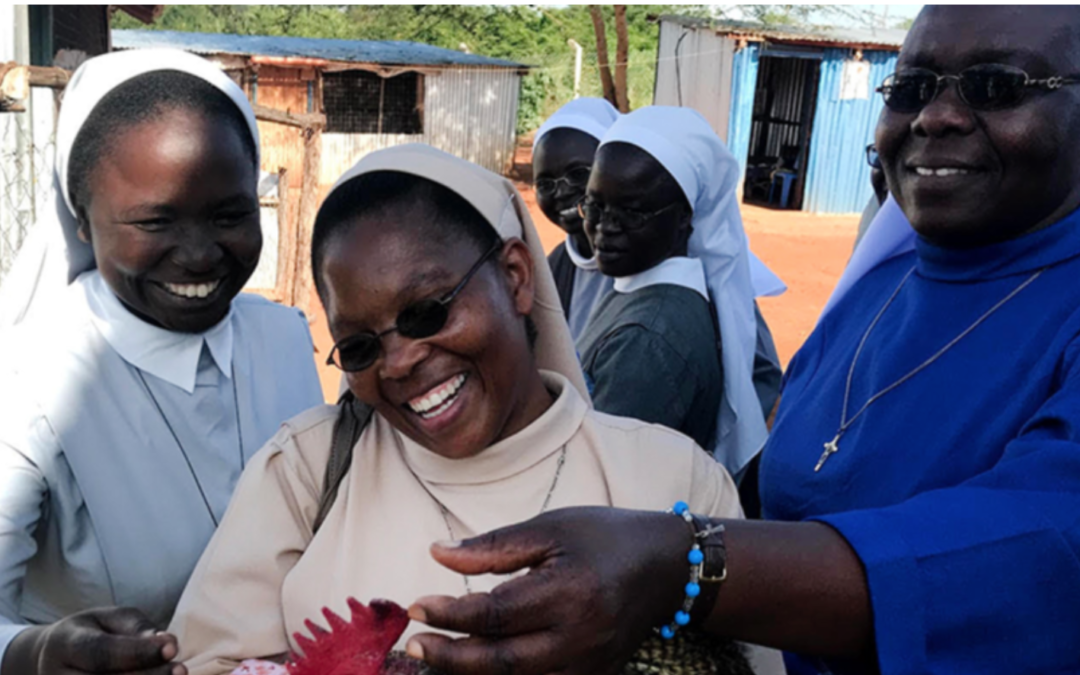
by Heather Adams, RNS | Apr 8, 2019 | Faith & Work |
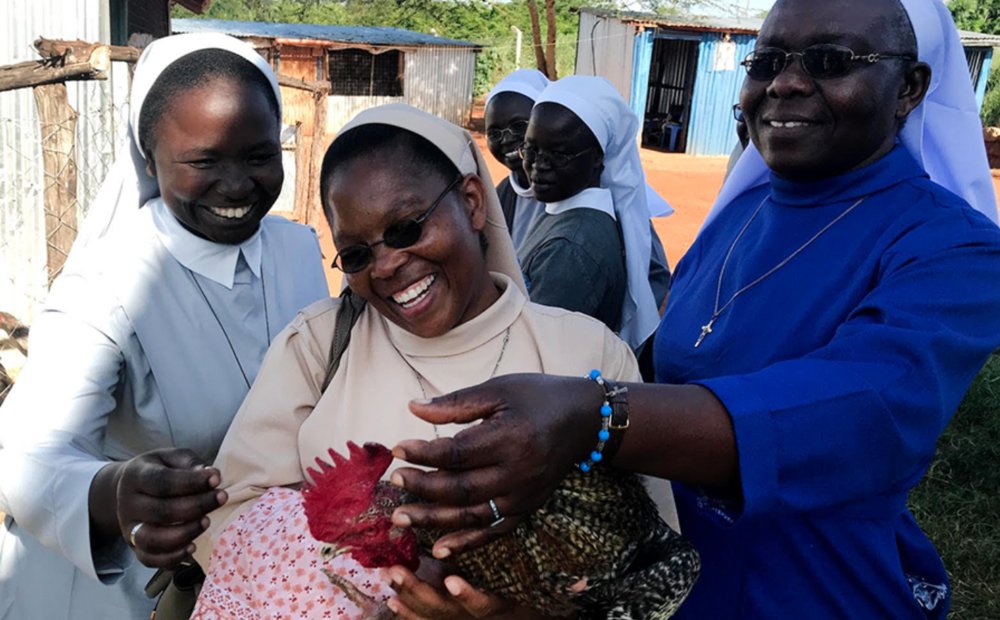
Sisters in Kenya handle chickens while learning about social enterprise opportunities at a poultry farm. Photo courtesy of Santa Clara University
Sister Christine Imbali of the Assumption Sisters of Eldoret, in western Kenya, has been working to help low-income women and families end their reliance on her small community of Catholic religious women and other charitable groups. Instead of a charity, she wants to give families in the country’s fifth-largest city the option to be self-sustaining and to contribute an important aspect of a healthy city — nutrition.
Her idea: chickens.
“You cannot evangelize to people who are hungry, who are dying, who are not getting an education,” Imbali said. In April, she hopes to introduce poultry farming to her families in hopes that social enterprise, as these kinds of helping businesses are known, will take off in Kenya.
The notion of do-gooding chickens originated in July of last year at the third Vatican Conference on Impact Investing in Rome. The conference was part of a series intended to “serve as a vital, long-term, global platform around Pope Francis’ vision of ‘placing the economy at the service of peoples,’” according to the conference’s report.
It was there that Sister Eneless Chimbali, secretary-general of the Association of Consecrated Women in Eastern and Central Africa, met Thane Kreiner, executive director of the 22-year-old Miller Center for Social Entrepreneurship, an “accelerator” of social enterprise startups at Santa Clara University, a Jesuit school in Northern California. The center focuses on poverty, climate change and social inequality and works with a diverse range of industries.
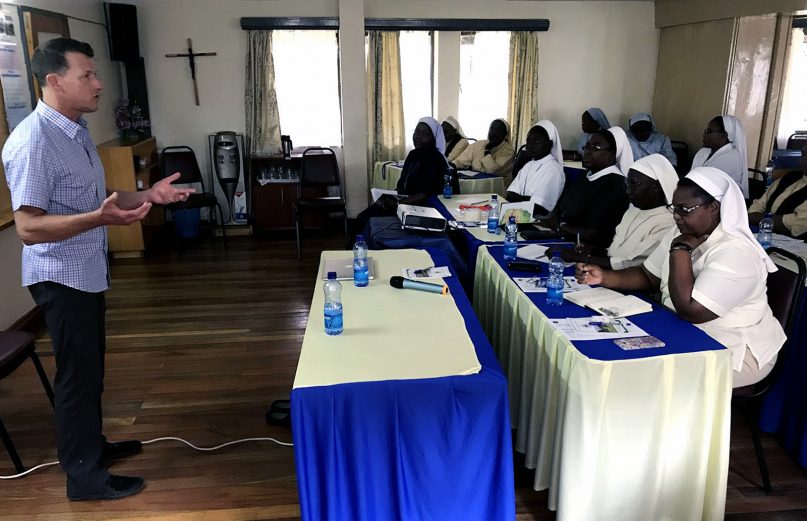
Thane Kreiner, left, addresses a Sisters Blended Value Project workshop in early March 2019. Photo courtesy of Santa Clara University
But just eight months later, in early March 2019, Kreiner found himself more than 9,500 miles from Silicon Valley addressing 35 Catholic sisters from Kenya, Malawi, Tanzania, Uganda, Zambia and Zimbabwe at a social enterprise workshop in Kenya.
The meeting was exactly the kind of unexpected partnership the planners of the Vatican conference had envisioned, said Beth Collins, Catholic Relief Services’ managing director of impact investing.
For Miller Center and the sisters, it meant the start of a whole new movement.
Chimbali said she had long been asking herself how the sisters would remain relevant in their home communities as resources dwindled. For Kreiner, who knew that social enterprise worked best when it came from those deeply invested in their communities, the lightbulb went off when he heard Chimbali tell the Rome conference: “Sisters are always there. Others come and go, but the sisters will always remain.”
The only remaining problem was funding.
Back in California, John Ottoboni, chief operating officer and senior legal counsel at Santa Clara University, had been waiting for the right way to honor his wife, Nancy, who had recently died from early-onset Alzheimer’s disease.
As a young woman, she had stopped short of making her final vows as a Sister of the Holy Cross but continued to stay close to the order, and the friendship has continued through Ottoboni.
He saw Miller Center’s workshops as a meaningful way to keep alive the memory of a woman he describes as “the soul of kindness.”
“To continue to honor her memory is a joy, one that tempers the profound sense of loss that surfaces from time to time,” he said. “In a small way I felt like we were walking with (the sisters) on what may prove to be an expanded journey for them.”
The project, now known as the Sisters Blended Value Project, has generated ideas for social enterprise startups ranging from Imbali’s local poultry farming to health care programs. Miller Center hopes to replicate the March workshop at other ACWECA congregations. There are more than 400 member congregations, comprising some 30,000 sisters.
Kreiner expects that if he can reach 10 percent of the congregations over the next three years, the movement will spread through the sisters’ network to grow the number of social enterprises.
“Our idea at the end of this project is for you to transform your social ministries into social enterprises,” said Sister Cecilia Njeri, ACWECA’s president, in her opening remarks at the March workshop.
At the workshop, the sisters began by discussing the problems in their communities, then moved to how they could fix them. By the end of the workshop, the sisters each had a 90-second elevator pitch.
Some of the sisters had previous experience in business. Sister Juunza Mwangani of the Religious Sisters of the Holy Spirit in Zambia has a business degree, but prior to the workshop she had never blended her charity work with her business experience.
“I think in a lot of people’s minds there’s been this artificial distinction between doing good and using business strategies,” Kreiner said.
At the hospital where she works, Mwangani hopes to create a system where those who want private rooms, fast-tracked service and other accommodations can get them by paying more. The extra money will then pay for those who can’t afford to visit the hospital at all.
Another program will establish a school for middle-class girls, whose tuition will subsidize the fees of children from low-income families.
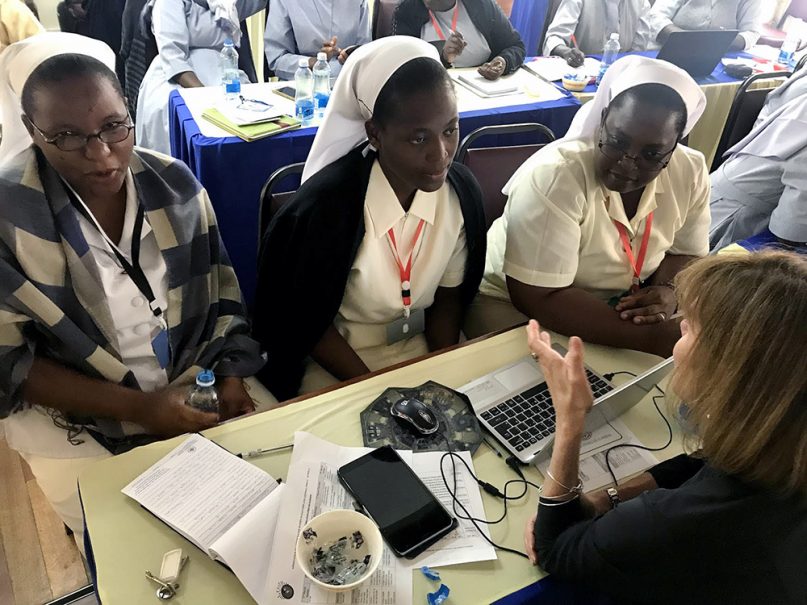
Sister Juunza Mwangani, center, participates in a Sisters Blended Value Project workshop with fellow nuns in early March 2019 in Kenya. Photo courtesy of Santa Clara University
Mwangani also hopes to teach the rest of her community the things she learned at the workshop.
“I was tasked with coming back to teach everyone else in my community,” Mwangani said. “And I’m ready to do that.”
For many Africans, the most difficult adaptation will be to the idea of the church asking them to make their own way. In some communities, Mwangani pointed out, it has become expected that whatever the church offers is given out for free. With the social enterprise model, mindsets will have to change.
“The approach we have taken will meet a bit of resistance in some communities,” she said. “But we are not going to leave them behind. We are going to get them on board.”
Another hurdle is the slim success rate of startups, 60 percent to 90 percent of which fail.
But for these sisters, failure isn’t new. If a sister’s original idea fails, Chimbali said, the sisters will “be quick to start another direction.”
And together, they will learn from each other’s failures and successes — hoping to start a movement that could change their communities for generations to come.
“It’s my prayer that it does not end with this generation,” Imbali said. “But a foundation laid down to change the face of the community.”






